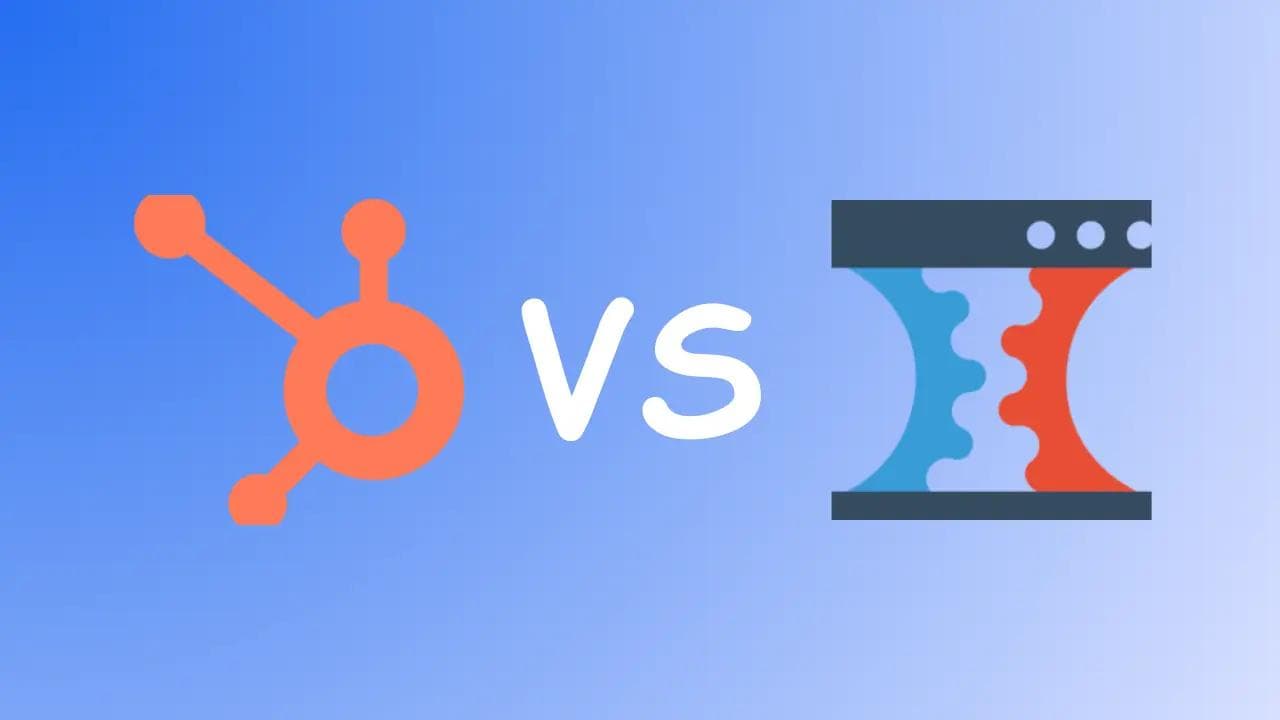
HubSpot Vs ClickFunnels? Picking the Best for Your Business
Unbeatable Software
September 19, 2023 at 5:14 PM
Remember that the tools you choose can make or break your online business. With a plethora of platforms vying for your attention, two names often rise to the top of the conversation: HubSpot and ClickFunnels.
Both are powerhouses in their own right, each boasting a suite of features designed to turn prospects into paying customers. But which one is the golden ticket for your business?
Is it HubSpot with its comprehensive inbound marketing tools and CRM capabilities? Or is it ClickFunnels, the funnel-building juggernaut that promises to supercharge your sales? As you embark on this journey of discovery with us, we'll delve deep into the strengths, weaknesses, and unique offerings of each platform.
By the end, you'll be equipped to make an informed decision, ensuring your business not only survives but thrives in the competitive online marketplace. So, buckle up, and let's unravel the mystery together!
What is Hubspot?
HubSpot has carved a niche for itself as a leading figure in the world of Marketing Automation software. Its reputation is built on its ability to help businesses harness the power of their data and strategies, transforming them into actionable insights and automated tasks.
One of the standout features of HubSpot is its emphasis on automation, particularly in areas like email campaigns and website landing pages. This automation ensures that businesses can engage their audience effectively, without getting bogged down in the minutiae of manual processes.
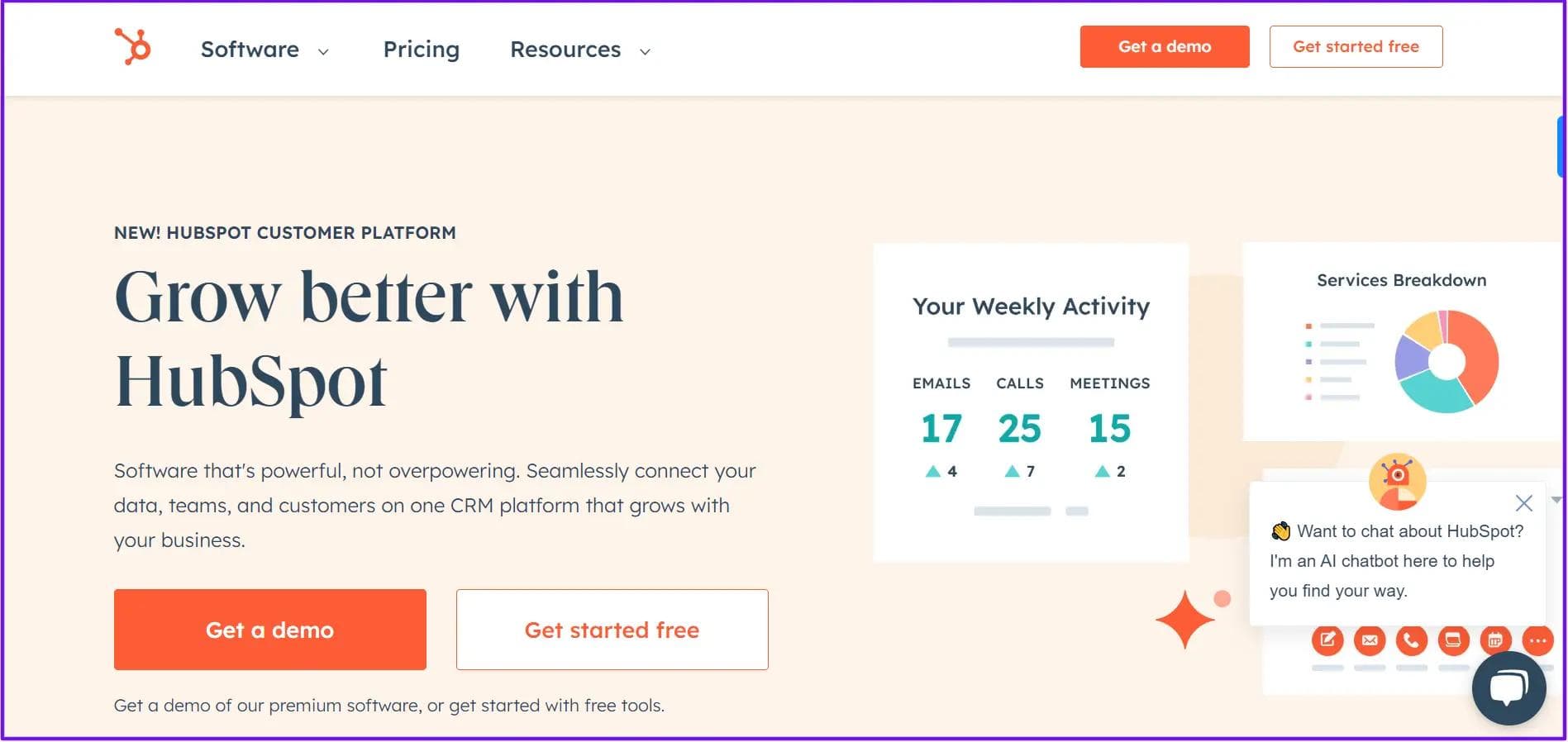
But what truly sets HubSpot apart is its integrated Content Management System (CMS). This isn't just a tool to manage content; it's a holistic platform designed to handle every aspect of content creation, management, and distribution.
Explore In Detail!
Whether you're drafting a new blog post, analyzing the performance of a landing page, or tweaking the design of your website, HubSpot's CMS ensures that everything is done seamlessly. The end result is a platform that not only simplifies the marketing process but also amplifies its impact, allowing businesses to communicate their message without interruption or hassle.
What is ClickFunnels?
ClickFunnels has emerged as a go-to solution for marketers aiming to craft high-converting sales funnels with efficiency and precision. At its essence, ClickFunnels is not just about creating funnels; it's about accelerating the process and enhancing the outcome.
Another strength lies in its library of custom-designed templates. These aren't just any templates; they're backed by data and designed with conversion in mind, ensuring marketers have a head start in their funnel-building journey.
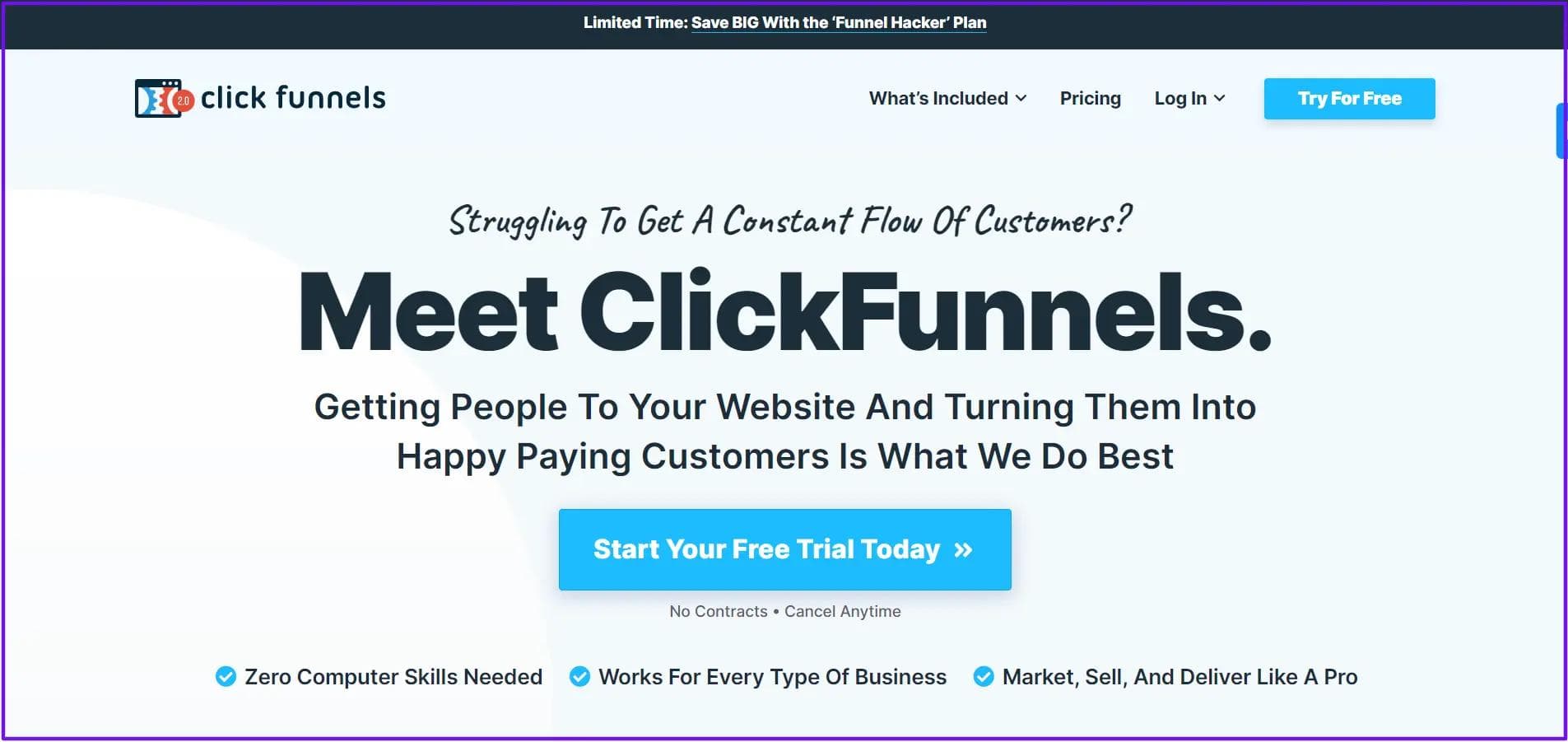
The platform's user-friendly nature is further exemplified by its intuitive drag-and-drop interface. This feature empowers users, even those without a technical background, to design and refine their landing pages to perfection. No longer does one need to rely on extensive coding or design experience; with ClickFunnels, a compelling and effective landing page is just a few drags and drops away.
Explore In Detail!
But the capabilities of ClickFunnels don't stop there. Its built-in page analytics provide invaluable insights into conversion metrics, allowing marketers to tweak and optimize their strategies in real time.
In essence, ClickFunnels is more than a tool—it's a comprehensive ecosystem that equips marketers with everything they need to capture, engage, and convert their audience.
Pros and Cons of Hubspot
Pros of Hubspot
1. Robust Email Marketing Capabilities:
In the digital age, email remains a pivotal touchpoint between businesses and their audiences. HubSpot elevates this interaction with its advanced email marketing tools. From crafting personalized email campaigns to setting up automated sequences tailored to user behaviors, HubSpot ensures that every email sent is impactful.
Coupled with detailed analytics, businesses can continually refine their email strategies for maximum engagement and conversion.
2. Comprehensive Reporting and Analytics:
In the realm of marketing, content is king. HubSpot's comprehensive reporting tools empower businesses to dive deep into their campaign metrics, audience behaviors, and conversion pathways.
With visual dashboards and customizable reports, marketers can glean actionable insights, making data-driven decisions that propel their strategies forward.
3. Seamless Integration Capabilities:
The digital landscape is vast, with various platforms playing crucial roles in a business's online presence. HubSpot acts as a unifying force, offering seamless integrations with social media channels, CRM systems, webinar platforms, and more.
This interconnected ecosystem ensures that data flows smoothly, and marketing efforts are harmonized across all touchpoints.
4. Advanced Marketing Automation and Segmentation:
Beyond mere task automation, HubSpot offers a sophisticated suite of marketing automation tools. Its capabilities extend to advanced audience segmentation, allowing businesses to categorize their leads and customers based on behaviors, preferences, and interactions.
This granularity ensures that every campaign is targeted, relevant, and resonates with the intended audience.
5. User-Friendly Yet Powerful Interface:
At the intersection of simplicity and power lies HubSpot's user interface. Designed with both novices and experts in mind, the platform offers an intuitive experience without compromising on advanced features. This balance ensures that businesses of all sizes and expertise levels can harness the full potential of their digital marketing efforts.
6. Enhanced Lead Scoring Mechanisms:
Understanding and prioritizing leads is fundamental to sales and marketing alignment. HubSpot's lead scoring features delve into the nuances of lead behaviors and interactions, assigning scores that help businesses identify high-potential leads.
This prioritization ensures that sales efforts are directed efficiently, maximizing conversion opportunities.
7. Tailored Content Delivery for Diverse Audiences:
In a world clamoring for attention, delivering the right message to the right audience is paramount. HubSpot's tools are adept at tailoring content, ensuring that every piece, whether a blog post, email, or ad, speaks directly to its intended audience. This personalization fosters deeper connections and drives higher engagement rates.
8. Efficient A/B Testing for Campaign Optimization:
The path to marketing excellence is iterative. HubSpot's A/B testing tools are designed for continuous improvement. By allowing marketers to test different campaign elements side-by-side, from email subject lines to landing page designs, businesses can gather real-time feedback and optimize their strategies for peak performance.
9. Streamlined Web Content Creation:
Digital real estate, like landing pages, plays a crucial role in capturing and converting leads. HubSpot simplifies this creation process with its intuitive drag-and-drop editor and diverse template library.
Even without technical expertise, businesses can craft compelling web pages that serve as effective conversion touchpoints.
Sign Up For Free
Cons of Hubspot
1. Pricing Concerns for Advanced Features:
Value for money is a top consideration for many businesses. HubSpot, while offering a robust suite of tools, has a tiered pricing structure that can escalate costs for those seeking advanced functionalities.
As businesses delve deeper into the platform's features, they often find themselves needing to upgrade to pricier plans. In contrast, platforms like ClickFunnels adopt a more straightforward approach with a flat rate across all their offerings, ensuring financial predictability.
2. Limited A/B Testing Capabilities:
A/B testing is a cornerstone of effective digital marketing, allowing businesses to refine their strategies based on real-time feedback. While HubSpot does provide A/B testing tools, they are somewhat constrained, especially when compared to the extensive options offered by platforms like ClickFunnels. This limitation can hinder businesses from achieving granular insights and optimal campaign performance.
3. Challenges with Crafting Intricate Sales Funnels:
HubSpot's broad marketing suite, though comprehensive, faces hurdles when it comes to designing detailed sales funnels. Platforms like ClickFunnels, which are tailored for funnel creation, have the upper hand with their intuitive interfaces and flexible design capabilities.
This specialization enables users to design, launch, and monitor intricate sales funnels with ease, spotlighting a gap in HubSpot's offerings.
4. Restricted Template Offerings:
Templates are invaluable in the digital realm, enabling rapid campaign deployment. However, HubSpot's selection of pre-made templates is limited.
This limitation becomes evident when juxtaposed with ClickFunnels, which boasts a vast and customizable template library, granting users a wider creative spectrum and more adaptability.
5. Limitations in Integration Options:
A seamless marketing experience hinges on smooth integrations between platforms and tools. While HubSpot does offer some integration capabilities, its range, especially in the CRM domain, is narrower than desired.
On the other hand, ClickFunnels shines with its diverse integration options, ensuring businesses can effortlessly connect their preferred platforms, enhancing workflow efficiency.
Pros and Cons of ClickFunnels
Pros of ClickFunnels
1. Broad Integration Capabilities:
In today's digital ecosystem, the ability to integrate seamlessly with various marketing tools is invaluable. ClickFunnels excels in this domain, offering smooth connections with a myriad of marketing platforms.
This expansive integration ensures that businesses can tap into a diverse range of data, enriching their analytics and bolstering decision-making processes.
2. Mastery in Funnel Creation:
At the heart of ClickFunnels is its prowess in crafting sophisticated sales funnels. While other platforms like HubSpot Marketing provide a wide array of features, ClickFunnels hones in on funnel creation.
3. Cost-Effectiveness:
Budgetary considerations are always top of mind for businesses. ClickFunnels emerges as a cost-effective contender in the marketing platform arena, especially when juxtaposed with alternatives like HubSpot Marketing.
Its balanced pricing structure ensures businesses receive a potent combination of features without breaking the bank.
4. Enhanced Landing Page Customization:
The power of a compelling landing page cannot be overstated. ClickFunnels offers an extensive toolkit for designing and customizing landing pages to align with specific campaign goals.
Whether targeting a product launch or a webinar registration, ClickFunnels ensures each landing page resonates with its intended audience and drives conversions.
5. Unique Page Creation with Conversion Tracking:
Beyond just funnels and landing pages, ClickFunnels stands out with its capability to craft unique pages tailored to diverse campaigns.
Paired with its robust conversion tracking, businesses gain real-time insights into page performance, allowing for agile strategy adjustments and continuous optimization.
6. Comprehensive Sales Funnel Reporting:
A sales funnel's success hinges on continuous refinement. ClickFunnels offers in-depth reporting across all funnel stages. These granular insights empower businesses to pinpoint areas of improvement, ensuring each funnel step is primed for maximum engagement and conversion.
Sign Up For Free
Cons of ClickFunnels
1. Pricing Concerns:
While ClickFunnels offers a range of features tailored to funnel creation and optimization, its pricing structure can be a point of contention for some businesses. When compared to HubSpot's marketing options, ClickFunnels tends to be on the pricier side.
This cost differential can be a significant consideration for businesses operating on tighter budgets or those seeking a more comprehensive suite of tools at a lower price point.
2. Narrowed User Experience:
ClickFunnels, by design, is laser-focused on guiding users down specific page paths, optimizing for funnel conversions. While this approach has its merits, it contrasts with platforms like HubSpot Marketing, which adopt a more holistic approach to the customer experience.
HubSpot's broader perspective ensures that users aren't just funneled but are also provided with a comprehensive and engaging journey.
3. Limited Analytics Depth:
Analytics are the backbone of any successful digital marketing strategy. While ClickFunnels offers insights tailored to funnel performance, it doesn't delve as deep as some competitors.
HubSpot Marketing, for instance, boasts advanced analytics capabilities, providing businesses with a more granular view of their campaigns, audience behaviors, and overall digital performance.
4. Constraints in Templates & Design:
A platform's design capabilities can significantly influence the quality and effectiveness of digital campaigns. While ClickFunnels provides template options tailored to its funnel-centric approach, its offerings can seem limited, especially when compared to HubSpot.
HubSpot shines with its robust design capabilities, offering a broader range of templates that can be customized to fit diverse marketing needs.
5. Integration Limitations:
In the interconnected world of digital tools and platforms, integration capabilities are paramount. While ClickFunnels does offer integration options, its range is somewhat limited, especially when juxtaposed with HubSpot.
HubSpot not only provides a broader array of integrations but also includes specialized packages, such as organic search engine optimization tools, enhancing its overall utility for businesses.
The Battle of Features: HubSpot vs. ClickFunnels
The Showdown on Customer Support: HubSpot vs. ClickFunnels
In the intricate dance of digital marketing, even the most seasoned professionals can stumble. Whether it's a miscommunication, a glitch in an order form, or a hiccup during the checkout process, challenges are inevitable.
This is where stellar customer support becomes the unsung hero, ensuring that marketing campaigns run smoothly and that any issues are addressed promptly.

ClickFunnels: A Beacon in the Night
ClickFunnels shines brightly when it comes to customer support. Their team stands ready around the clock, offering 24/7 assistance. Whether it's a query about a specific feature or a broader question about their platform, ClickFunnels ensures that help is just a call or click away, no matter the hour.
HubSpot: The Daylight Supporter
HubSpot, while renowned for its comprehensive suite of tools, takes a more traditional approach to customer support. Their team is on hand during standard business hours, which might pose challenges for those burning the midnight oil or operating in different time zones.
When it comes to unwavering, round-the-clock support, ClickFunnels takes the crown as the go-to choice.
The Duel of Drag-and-Drop: HubSpot vs. ClickFunnels
The ability to craft compelling landing pages can make or break a campaign. Enter the Page Builder—a tool akin to a magic wand for marketers, allowing them to conjure stunning pages without delving into the intricacies of coding.
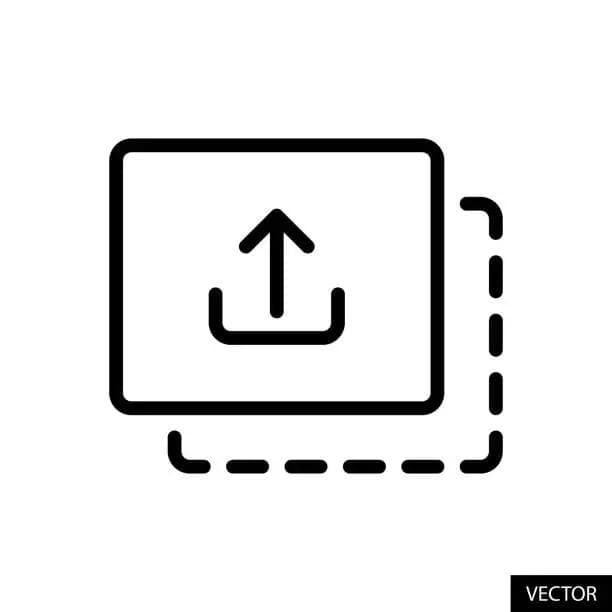
ClickFunnels: The Intuitive Architect
ClickFunnels' Page Builder is designed with simplicity in mind. Emulating the ease of a drag-and-drop editor, it empowers marketers to swiftly design landing pages, regardless of their technical prowess.
If you're inclined to use professionally crafted templates or wish to venture into creating your own masterpiece, ClickFunnels guides you through an intuitive process, ensuring that even beginners feel like seasoned designers.
HubSpot: The Technical Maestro
HubSpot's approach to page building, while equally powerful, leans slightly more towards the technical side. Despite this, it remains accessible to those without coding knowledge. Like ClickFunnels, HubSpot offers a treasure trove of professionally designed templates.
But for those with a spark of creativity, it also provides a guided journey to craft pages from the ground up, ensuring that every pixel aligns with the marketer's vision.
It's a tight race between ClickFunnels and HubSpot when it comes to page building. Both platforms offer user-friendly processes, ensuring marketers can bring their visions to life without getting entangled in code.
Whether you prioritize a straightforward drag-and-drop experience or a slightly more technical approach with added flexibility, both tools stand ready to elevate your landing page game.
The Clash of Titans: Sales & Marketing Features in HubSpot vs. ClickFunnels
Sales and marketing features stand as the pillars of any automation software, and having a robust arsenal is non-negotiable.

ClickFunnels: The Revenue Booster
ClickFunnels has meticulously crafted its Sales and marketing features to serve three primary goals: brand building, customer base expansion, and revenue growth. Every tool within its suite, from real-time statistics to comprehensive sales and lead management systems, is designed to amplify brand visibility.
Add to this their email marketing capabilities, and you have a platform primed to skyrocket brand awareness and conversions.
HubSpot: The Comprehensive Marketer's Dream
HubSpot, a behemoth in the marketing world, offers a vast expanse of Sales & Marketing tools. Whether it's crafting compelling landing pages, capturing leads through diverse channels like social media or emails, or nurturing these leads through their journey, HubSpot has it covered.
Their suite extends to email marketing, social media management, and a plethora of other tools, ensuring every facet of digital marketing is addressed.
Both platforms come equipped with a formidable set of tools designed to bolster revenue and brand presence.
Crafting the Digital Canvas: Customization in HubSpot vs. ClickFunnels
For small businesses, this brushstroke can be transformative, allowing them to experiment, gather insights from visitor behaviors, and tailor experiences that can boost conversions and sales.

ClickFunnels: The Master Sculptor
ClickFunnels offers a deep dive into the world of customization. It's not just about tweaking; it's about crafting. Users can construct an entirely tailored funnel from the ground up, deciding on the types of fields in their forms and even employing conditional logic to dynamically alter content based on user input.
HubSpot: The Intuitive Artisan
HubSpot offers a more streamlined approach to customization, making it a breeze for users of all skill levels. While it might not boast the depth of ClickFunnels' features, its drag-and-drop interface ensures swift and easy adjustments. Plus, its template library is a treasure trove, stocked with designs suited for diverse business needs.
When it comes to the art of customization, ClickFunnels emerges as the more intricate tool, allowing for granular personalization that can potentially elevate conversion rates and overall sales. HubSpot, while simpler, offers a user-friendly approach, ensuring that even those new to the digital space can craft appealing web elements with ease.
Navigating the CRM Landscape: HubSpot vs. ClickFunnels
With marketing automation, businesses can streamline operations, gaining a clearer understanding of their customers' preferences, from their social media engagements to their online purchasing patterns.
Harnessing this knowledge can revolutionize marketing strategies. It's like having a magnifying glass over your audience's preferences, allowing you to refine campaigns, enhance your online presence, and foster deeper customer relationships—all translating to a fortified brand and a healthier bottom line.
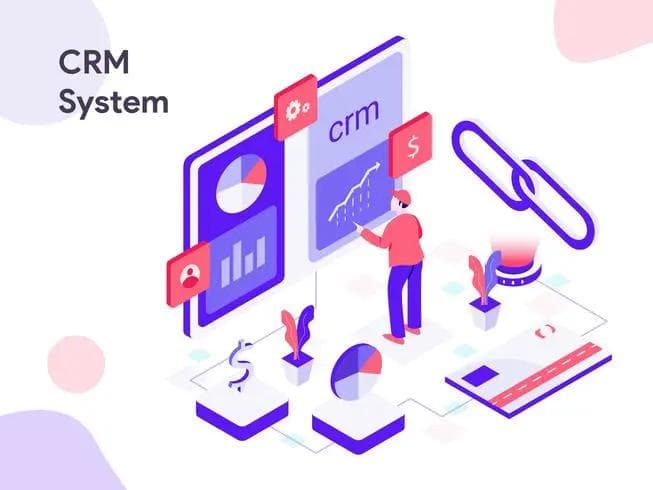
ClickFunnels: The CRM Powerhouse
ClickFunnels' CRM capabilities are nothing short of comprehensive. Beyond just adding contacts, it facilitates automated follow-up emails, custom data fields for intricate tracking, and more.
But where ClickFunnels truly shines is its seamless integration of CRM with its core offering: sales funnels and marketing automation. It's a holistic approach, ensuring every touchpoint with a customer is informed and impactful.
HubSpot: The CRM Essentialist
HubSpot offers a solid foundation in CRM. It covers the essentials, from lead capture to contact management. While it might not delve as deep as ClickFunnels in advanced features, it holds its own with integrations, effortlessly connecting with popular email platforms like Gmail and Outlook. It's a straightforward solution for businesses seeking CRM basics without the bells and whistles.
Your choice between ClickFunnels and HubSpot hinges on your CRM needs. If you're in pursuit of a robust CRM ecosystem that seamlessly intertwines with sales funnels and marketing automation, ClickFunnels stands out as the frontrunner.
The Digital Marketplace Duel: HubSpot vs. ClickFunnels
In today's digital age, e-commerce isn't just a feature—it's the lifeblood of many businesses. These tools enable companies to showcase their offerings online, broadening their reach and amplifying revenue potential.
While e-commerce features are a staple for many platforms, from WordPress to Shopify, their integration and capabilities can vary, especially when it comes to marketing automation platforms like ClickFunnels and HubSpot.

ClickFunnels: The E-commerce Enthusiast
ClickFunnels integrates e-commerce features seamlessly into its platform, recognizing its pivotal role in marketing automation. Its versatility shines through, offering custom fields that cater to diverse business needs, ensuring that every online storefront is as unique as the brand it represents.
HubSpot: The E-commerce Minimalist
HubSpot takes a more reserved approach to e-commerce. While it does offer e-commerce capabilities, they aren't part of the basic package. This means businesses might find themselves incurring additional costs to unlock these features. While HubSpot's e-commerce tools are robust, they lack some of the customizability that ClickFunnels boasts, potentially limiting the depth of personalization.
However, both platforms play a crucial role in marketing automation, aiding businesses in expanding their digital footprint and driving revenue. The choice between the two will largely depend on the specific e-commerce needs and budget constraints of a business.
Deciphering Data: HubSpot vs. ClickFunnels
In the realm of marketing, analytics isn't just a feature—it's the compass guiding every strategic decision. By offering insights into campaign performance, analytics tools empower marketers to refine their strategies, ensuring optimal resource allocation and maximum impact.

ClickFunnels: The Conversion Connoisseur
ClickFunnels brings a suite of analytics tools to the table, from lead scoring and funnel reporting to conversion rate optimization. A standout feature is its ability to track upsell conversions and gauge customer lifetime value. Moreover, ClickFunnels introduces a dynamic lead-scoring system.
HubSpot: The Traffic Tracker
HubSpot delves deep into analytics, offering insights into diverse metrics like traffic sources, conversion rates by channel, and opportunity scores for sales leads. But where HubSpot truly shines is in its detailed traffic source analytics. By tracking elements like IP addresses, browser types, and individual page views, HubSpot paints a comprehensive picture of a user's journey. This means marketers can discern which site pages were pivotal in a user's decision to sign up or make a purchase, allowing for more targeted future campaigns.
When it comes to analytics prowess, both ClickFunnels and HubSpot stand as titans. Each platform offers a treasure trove of insights, with ClickFunnels excelling in lead targeting and HubSpot shining in traffic analysis. For marketers, the choice boils down to specific analytics needs and which platform's features align more closely with their objectives.
The Art of A/B Testing: HubSpot vs. ClickFunnels
A/B testing is the marketer's microscope, allowing them to zoom in on what truly resonates with their audience. Whether it's fine-tuning landing page layouts, tweaking copy, or optimizing email subject lines, A/B testing provides invaluable insights to maximize engagement and conversions.
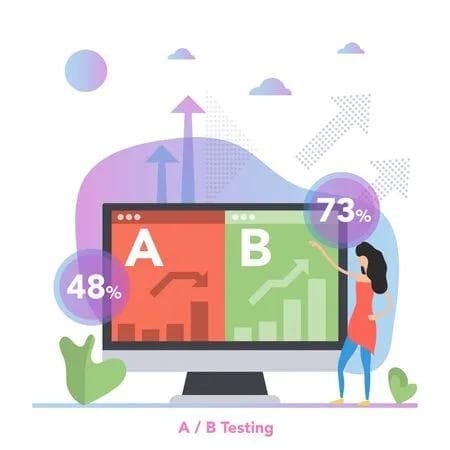
ClickFunnels: The Automated Analyst
ClickFunnels takes the hassle out of A/B testing. With automatic testing for landing pages, users can effortlessly determine which designs and copy variants yield the best results.
Beyond just testing, ClickFunnels offers a comprehensive analytics suite, delivering real-time insights on metrics like conversions, sales probabilities, average order values, and email open rates. This holistic approach ensures marketers have a 360-degree view of their campaigns' performance.
HubSpot: The Manual Tester
HubSpot offers tools for A/B testing but with a more hands-on approach. While users can create multiple landing page versions to gauge effectiveness, the testing process is manual. This might mean a longer duration to derive conclusive results.
Furthermore, HubSpot's A/B testing is limited to landing pages, leaving out other marketing avenues like emails. For a deeper dive into data analytics, users might find themselves considering add-on services, which come at an additional cost.
For marketers seeking streamlined A/B testing with integrated analytics, ClickFunnels might be the platform of choice.
HubSpot vs. ClickFunnels - The Final Verdict
Navigating the digital marketing landscape requires tools that are not only robust but also tailored to a brand's unique needs. Both HubSpot and ClickFunnels have proven themselves as formidable platforms, each with its own strengths.
ClickFunnels shines with its automated features, comprehensive analytics, and a focus on conversion optimization. HubSpot, on the other hand, offers a more holistic approach to marketing with a user-friendly interface and a wide array of features, albeit with some limitations.
As the digital realm continues to evolve, it's crucial for marketers to choose a platform that not only addresses current challenges but also anticipates future trends. Whether you lean towards HubSpot or ClickFunnels, the key is to harness their capabilities to craft compelling, data-driven campaigns that resonate with your audience.
Table of Content
- What is Hubspot?
- What is ClickFunnels?
- Pros and Cons of Hubspot
- Pros and Cons of ClickFunnels
- The Battle of Features: HubSpot vs. ClickFunnels
- The Showdown on Customer Support: HubSpot vs. ClickFunnels
- The Duel of Drag-and-Drop: HubSpot vs. ClickFunnels
- The Clash of Titans: Sales & Marketing Features in HubSpot vs. ClickFunnels
- Crafting the Digital Canvas: Customization in HubSpot vs. ClickFunnels
- Navigating the CRM Landscape: HubSpot vs. ClickFunnels
- The Digital Marketplace Duel: HubSpot vs. ClickFunnels
- Deciphering Data: HubSpot vs. ClickFunnels
- The Art of A/B Testing: HubSpot vs. ClickFunnels
- HubSpot vs. ClickFunnels - The Final Verdict
SHARE THIS ARTICLE
MORE ARTICLES
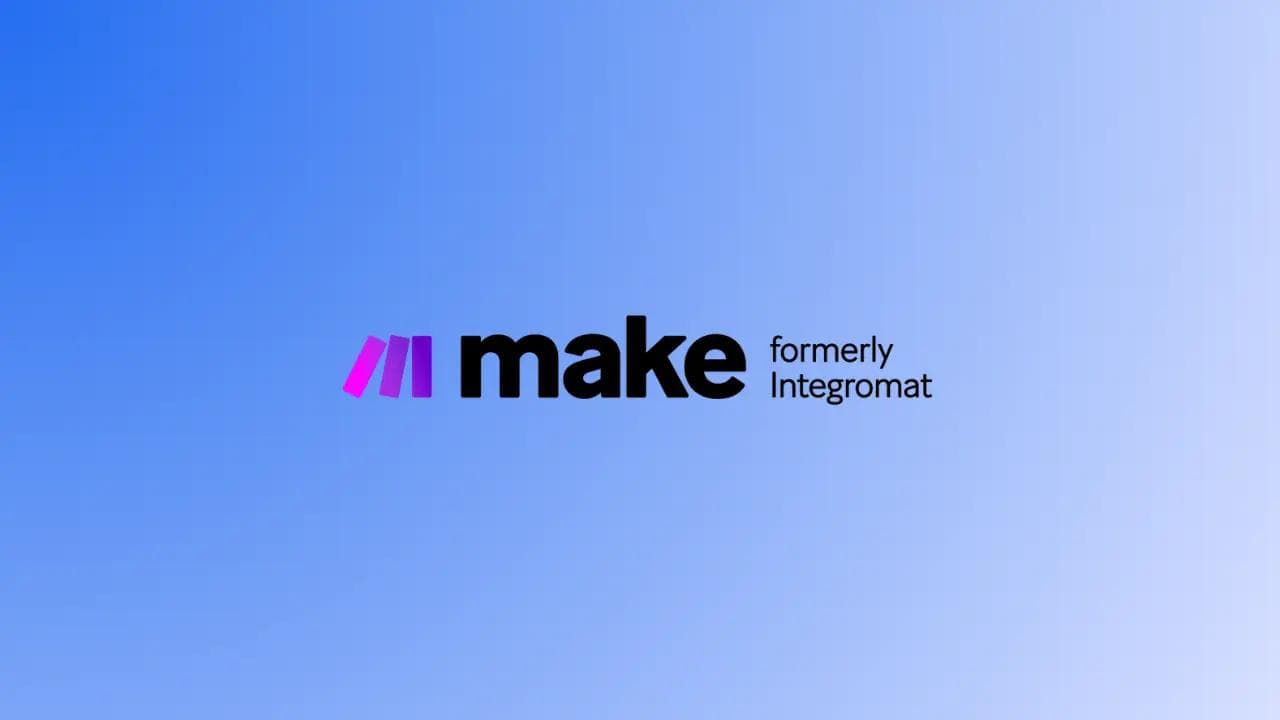
Everything You Need to Know about Make (Integromat) | Make Review
2023-07-31T20:46:00.000Z
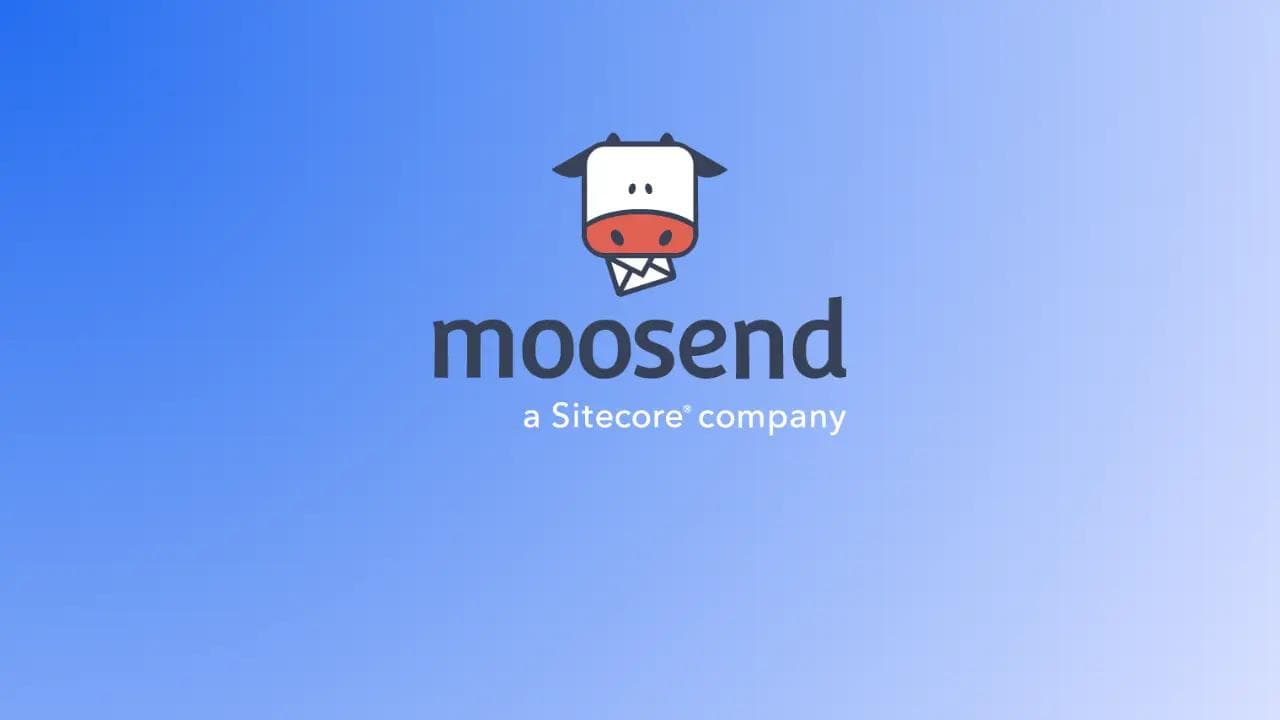
Moosend Review: Maximize your Marketing Potential
2023-11-04T20:00:00.000Z

Convertkit Review: Nourish Leads from Sign Up to Sale
2023-09-17T05:00:00.000Z
![My Honest GetResponse Review 2023 [My Email Marketing Experience]v image](/_next/image/?url=https%3A%2F%2Fcdn.sanity.io%2Fimages%2F3wk81ifu%2Fproduction%2F468e0790210d0e5537cc2c06a78cfbe2c6028410-1280x720.png&w=3840&q=75)
My Honest GetResponse Review 2023 [My Email Marketing Experience]v
2023-05-15T17:30:00.000Z
Subscribe for
the latest updates
